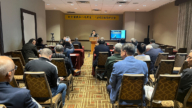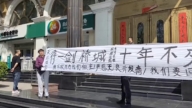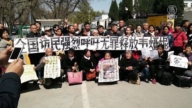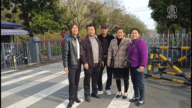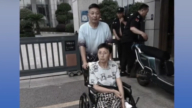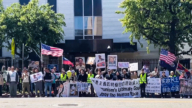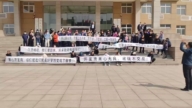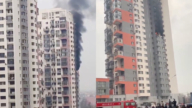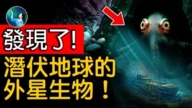【新唐人2013年05月18日訊】中共當局最近以政治重罪集體打擊維權人士。江西新余市公民劉萍、魏忠平和李思華,日前相繼被當地警方以涉嫌「煽動顛覆國家政權罪」刑事拘留。劉萍等五人是因為舉牌要求官員公示財產,以及聲援北京、廣東兩地被當局關押的人士而遭到警方拘押,其中兩人已被低調釋放。目前,三人集體被控涉嫌「煽動顛覆國家政權罪」,被認為是中共維穩的罕見舉動,以及當局維穩升級的訊號。
劉萍、和魏忠平及李思華三人被抓之前,曾舉牌要求官員公示財產,並要求釋放北京等地舉牌被抓的人士。
一名大陸錢姓網友對於中共刑拘劉萍等三人,感到非常憤怒。他向《新唐人》表示,中共當局是「慾加之罪,何患無詞」。
網友錢先生:「魏忠平和劉萍他們一開始是根據中國的法律競選人大代表,當時受到了很多的阻攔,然後,劉萍和魏忠平又幫助一些下崗的工人維權,包括一些新的鋼鐵廠的工人,為了老百姓的利益,去幫助大夥兒爭取自己的權益。」
錢先生希望江西新余當局儘快放人。
「權利運動」負責人胡軍:「劉萍當時還沒有要求七常委公布財產,但北京那個是要求七常委公布財產。她那是要求官員公布財產。北京沒有直接定煽動顛覆國家政權罪,江西定的話,我覺得,肯定是他們當地政府定這個罪名。這個案子就證明了中共財產來源非法,否則就應該放棄這個審理。」
深圳律師龐琨是李思華的辯護律師,5月16號,龐琨告訴《美國之音》,作為代理律師,他至今還無法獲知李思華被刑拘的確切原因。他說,他當天向新余警方了解當事人的犯罪事實,但是遭到拒絕。
江蘇東南大學法學院教授張讚寧:「那刑事訴訟法明確規定,律師可以會見,有權會見。所謂顛覆國家政權,只有用武裝才能顛覆,劉萍只不過是要求一個公民的權利,要求有選舉權,就以顛覆國家政權罪把她抓起來,這是毫無道理的。那說明現在當局還是維護獨裁統治。」
南京律師張讚寧認為,按照中共領導人習近平的講法:要建設法制國家,實現憲政,但是現在的做法,卻跟習近平的講話背道而馳。
「權利運動」組織負責人胡軍則質疑,中共當局突然大規模抓人,並且以「煽動顛覆國家政權罪」入罪,到底是從哪裏出來的決定﹖
胡軍:「到底是政法委保守勢力在做?還是……習近平要求反腐,反腐最重要的就是財產公示,那麼,他又不允許……相互矛盾!如果說硬要起訴這些人,因為財產公示就煽動了國家政權的話,那麼,中共高官的財產來源是否是合法的?如果他是非法的話,那麼只能說,這個案子就證明了習近平他本身就是一個腐敗份子。」
杭州維權律師王成兩年前代理過李思華的案子,在新余曾被國保毆打。王成向《美國之音》表示,公民要求官員公開他們的個人財產,這是中國憲法賦予他們的言論自由權利。當局因為公民要求官員公開財產,以重罪拘押公民,是嚴重違憲做法。
胡軍:「中共這個政權被解體,被拋棄的話,並不是這幾個劉萍這些人所能為的,真正解體它的,還是它的所作所為造成的整個體制的崩潰。其實很簡單,是劉萍的作用大?還是王立軍跑美國領事館的作用大?還是薄熙來的作用大?」
北京社會活動人士胡佳也指出,當局以政治重罪集體打擊維權人士,是維穩手段的升級,目地是藉著「煽顛罪」罪名,打擊公民行動組織化和街頭化。
採訪/朱智善 編輯/周平 後製/李勇
The Chinese Communist Party Detains 3 Rights Activists for Political Crimes
The Chinese Communist Party (CCP) authorities have
recently charged human rights activists with political crimes.
Liu Ping, Wei Zhongping, and Li Sihua
are citizens of Xinyu city, Jiangxi province.
All were recently placed into detention by local police,
on suspicion of “incitement to subvert state power”.
Liu Ping and four other people were
detained because of holding banners.
They requested officials to publicize their properties, and
supported detained activists in Beijing and Guangdong.
Two of them have been released quietly.
Three activists have been charged
with “incitement to subvert state power”.
This is an uncommon action from the CCP.
The public considers this as a signal that the
regime is stepping up it’s ‘maintaining stability’.
Liu Ping, Wei Zhongping, and Li Sihua held banners
requesting officials to publicize properties, and to
release the activists who held banners in Beijing.
They were subsequently arrested.
A mainland Chinese netizen ‘Qian’ was angry
about the CCP detaining these three activists.
He told NTD that if the CCP wants to find fault with
someone, they don’t worry about finding a suitable pretext.
Mr. Qian, Netizen: “Wei Zhongping and Liu Ping wanted to
participate in the deputy elections, according to Chinese law.
They faced many obstacles.
They also helped some laid-off workers to defend their
rights, including some new workers in a steel plant.
They helped common people to
fight for their rights and benefits.”
Mr. Qian hopes that the Xinyu local
authority will release them soon.
Hu Jun, Head of “Human Rights Campaign in China”:
“Liu Ping didn’t request the 7 standing committee members
to publicize properties at that time, but the one in Beijing did.
She only requested officials to publicize properties.
Beijing authorities haven’t charged her
with ‘incitement to subvert state power’.
If Jiangxi authorities charge her, I think, it must
be the local authorities that give the charge.
They frame the case to target Xi Jinping and other
standing committee members, by kidnapping Liu Ping.
This case indicates that the CCP properties are from
illegal sources, otherwise, they would give up this trial.”
Shenzhen lawyer Pang Kun is defending for Li Sihua.
He told Voice of America, on May 16, that
as Li’s lawyer, it still remained for him to be
informed of the exact reason of Li’s detention.
He said that he requested the facts of the
crime from Xinyu police, but he was rejected.
Professor Zhang Zanning, Southeast University Law School:
“Criminal Procedure Law clearly defines that
the lawyer has the right to see the defendant.
In order to subvert state power, one needs armed forces.
Liu Ping is just a citizen requesting her right to be elected.
It’s unjustified to arrest her with ‘subversion of state power’.
It shows that the authority is still maintaining a dictatorship.”
Zhang Zanning believes that what the regime is
doing now is going against CCP leader Xi Jinping.
Xi called for “building a state of law,
and a constitutional government.”
Hu Jun, questions why the CCP regime has
suddenly arrested people on a large scale.
Hu also wonders where the decision came from, to
charge them with ‘incitement to subvert state power’.
Hu Jun: “Is it the conservative force of the Politics
and Law Committee that has been in charge?
Xi Jinping has called for anti-corruption, and the
most important part of this is to publicize properties.
However, Xi also doesn’t allow it, so it’s conflicting!
If requesting publicizing officials properties
can be called inciting subversion of state power,
I have to question whether high-level
officials’ properties are from illegal sources.
If they are from illegal sources, this case will further
show that Xi Jinping himself is a corrupted official.”
Hangzhou human rights lawyer Wang Cheng
acted on behalf of Li Sihua’s case two years ago.
He was beaten by State Security officers in Xinyu city.
Wang Cheng spoke to Voice of America.
Freedom of expression in China’s constitution
gives Chinese citizens the right to request
officials to publicize their properties.
It is severely against the constitution to charge
citizens with felony, simply because those
citizens wanted officials to publicize properties.
Hu Jun: “Liu Ping and her fellows can’t destroy
the CCP alone, or take down its authority.
It is the collapse of the system that will
truly destroy the CCP. It’s very simple.
Will the effect of Liu Ping’s action have larger ramifications?
Or the effect of when Wang Lijun fled to the
US embassy? Or the effect of Bo Xilai case?”
Beijing activist Hu Jia also says that the regime
charging rights activists with political felony
suggests a heightening of maintaining stability.
It uses “incitement to subvert state power” to suppress
citizens gathering together and holding activities.


